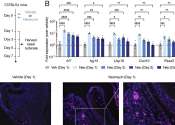New tool helps identify babies at high risk for RSV
A new tool to identify infants most at risk for severe respiratory syncytial virus (RSV) illness could aid pediatricians in prioritizing children under age 1 to receive a preventive medication before RSV season (October-April), ...
Apr 25, 2024
0
0









